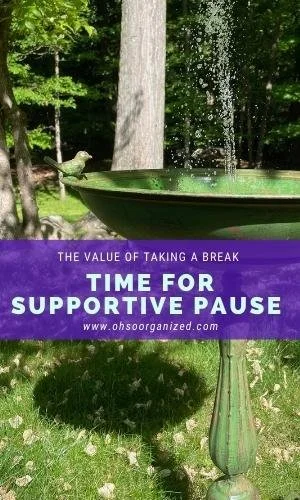The newest installment (v35) of the “What’s Interesting?” feature has my latest finds informing, educating, and relating to organizing and life balance. These unique, inspiring, time-related discoveries reflect this month’s blog theme.
You are a generous, communicative, and engaged group. I am deeply grateful for your presence, positive energy, and contributions to this community. I look forward to your participation and additions to the collection I’ve sourced.
What do you find interesting?
What’s Interesting? – 5 Best Time-Related Discoveries
1. Interesting Read – Slow Time
Does life feel hectic? Are your days overfilled with endless commitments and to-dos? In Seeking Slow – Reclaim Moments of Calm in Your Day, writer and photographer Melanie Barnes shares her philosophy and practices of “slow living.” It’s “a lifestyle that encourages a slower rhythm and values a mindful approach…It is about intentionally doing things and being present for each part of our day.”
This small, beautifully designed book encompasses living in a digital age, managing our time, creating a slow home, establishing slow-living rituals, and more. Barnes emphasizes, “Time is a resource that we simply cannot get back. Once it has gone, it is gone.”
Thoughtful questions include:
How can we use our time in a way that makes our lives meaningful?
What are we here for?
What is our purpose?
What is important to us?
What are our priorities?
2. Interesting Product – List Time
If you are easily overwhelmed by your daily tasks, Today’s Plan of Attack 4”x6” sticky notes by Knock Knock will help focus your thoughts and time. The categories and allotted space on the pad encourage a realistic approach to your day.
Organize them by what’s “most critical,” “would be nice,” or “not a chance.” Planning and prioritizing your tasks will give your day better flow and more satisfaction.
“Time is a resource that we simply cannot get back.”
3. Interesting Article – Productivity Time
In the “Your Productive Brain” article in BBC Science Focus, neuroscientist, author, and comedian Dr. Dean Burnett shares his best and worst productivity tips. He identifies which productivity strategies are myths versus ones that work and are backed by science. For example, it is a myth that waking at 4am will make you more productive. However, waking up when you’ve had a sufficient sleep is more advantageous (and productivity-inducing) than waking at 4am.
Other science-based productivity tips include listening to “some sort of background noise,” incorporating greenery in your workplace, exercising regularly, and eating healthfully. These have a positive influence on how our brain functions and result in boosting productivity. What enhances your productivity?
4. Interesting Resource – Reflection Time
FutureMe is a simple, surprising, and powerful resource. Go to their website to write a custom letter to yourself. It will be delivered by email at a future designated time you choose. Reflect and engage with time to send a positive message, capture a significant moment, create accountability around a goal, or share a challenge. You decide your message’s content, purpose, and delivery schedule. What a fascinating way to live in the present while touching the future. What message will you send to your future self?
5. Interesting Thought – Happy Time
As we transition from one season to the next, focus on being productive, and organizing your life, don’t neglect to make time for those things that bring you joy and happiness.
Over the last few weekends, I had some “make your soul happy” times. Exploring new places, meandering in nature, spending time with my husband and kids, eating special and delicious meals, walking along the High Line, and seeing “The Music Man” on Broadway helped restore and replenish my being. Making time to do things that make you happy isn’t frivolous. It’s essential to your wellbeing. What’s on your list?
What are your interesting time discoveries? Which of these resonate with you? I’d love to hear your thoughts. I invite you to join the conversation.















